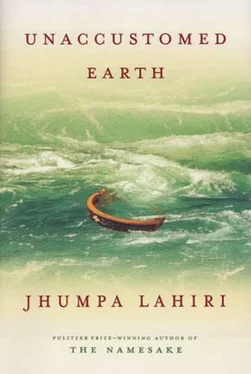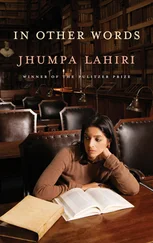Though she doted on him and adored him, she began to envy him in small ways. She envied him for his lean limbs while she grew slightly pudgy once her period came, and she envied him because people could call him Raoul, that he could introduce himself in crowds without questions. She envied him for his beauty; even when he was a child there was a clear sense of the handsome man he would become. His face defied the family mold. Sudha, with her father's rounded chin and her mother's low hairline, was transparently their offspring, but Rahul looked little like either of them, his genes pulled not from the surface but from some deeper, forgotten source. His complexion was darker, his skin an unmistakable brown, his pronounced features lacking the indeterminate quality she and her parents shared. He was allowed to wear shorts in summer, to play sports in school, things her mother considered inappropriate for a girl. Sudha supposed it was a combination of his being a boy and being younger, and her parents being more at ease with the way things worked in America by then. Sudha had no fondness for her younger self, no sentimental affection for the way she had looked or the things she had done. what she felt was an overwhelming sense of regret, for what exactly she did not know. She had looked, of course, perfectly ordinary, her black hair worn in pigtails or braids, grown to her waist one year and cut like Dorothy Hamill's the next. And she had done ordinary things: attended slumber parties and played clarinet in the school band and sold chocolate bars from door to door. And yet she could not forgive herself. Even as an adult, she wished only that she could go back and change things: the ungainly things she'd worn, the insecurity she'd felt, all the innocent mistakes she'd made.
Thanks to Rahul there was also someone else to witness the perplexing fact of her parents' marriage. It was neither happy nor unhappy, and the lack of emotion in either extreme was what upset Sudha most. She would have understood quarrels, she believed she would even have understood divorce. She always hoped some sign of love would manifest itself; the only things that consoled her were a few pictures taken during their London years. Her mother looked unrecognizably slim, hair styled at a salon, a woven purse shaped like a cornucopia dangling from the crook of her elbow. Even her saris were glamorous back then, tightly wrapped to show off her figure, patterned with a spidery brown batik. Her father seemed vaguely mod, wearing suits with narrow dark ties and sunglasses. Those were the days, Sudha, supposed, when immigration was still an adventure, living with paraffin heaters, seeing snow for the first time.
Wayland was the shock. Suddenly they were stuck, her parents aware that they faced a life sentence of being foreign. In London her mother had been working toward a certificate in Montessori education, but in America she did not work, did not drive. She put on twenty pounds after Rahul was born, and her father put away his mod suits and shopped at Sears. In Wayland they became passive, wary, the rituals of small-town New England more confounding than negotiating two of the world's largest cities. They relied on their children, on Sudha especially. It was she who had to explain to her father that he had to gather up the leaves in bags, not just drag them with his rake to the woods opposite the house. She, with her perfect English, who called the repair department at Lechmere to have their appliances serviced. Rahul never considered it his duty to help their parents in this way. While Sudha regarded her parents' separation from India as an ailment that ebbed and flowed like a cancer, Rahul was impermeable to that aspect of their life as well. "No one dragged them here," he would say. "Baba left India to get rich, and Ma married him because she had nothing else to do." That was Rahul, always aware of the family's weaknesses, never sparing Sudha from the things she least wanted to face.
Another semester passed before she saw him again. She was accepted at LSE, and in June she came home to Wayland for a week. During her visit, Sudha gave herself fully to her parents, watching wimbledon with her father on television, helping her mother cook and order new blinds for the bedrooms. She was always in the house, while Rahul drifted in and out without explanation. He was waiting tables part time at a seafood restaurant out in Scituate, thirty-five miles away, sleeping most days, working dinner shifts, out with friends after that. These were no longer friends from high school, boys Sudha had known since Rahul started kindergarten. Instead, they were people he met working at the restaurant, people he never bothered to invite home.
His aloofness troubled Sudha, but her parents said nothing. He seemed always to be in a slightly bad mood and in urgent need to get somewhere-to his job, to a gym where he went to lift weights, to the video store to return one of the foreign films he would watch when everyone else was asleep. She and Rahul never argued, but there were moments, when she crossed paths with him in the hallway or asked him to pass her the remote control, when she was briefly convinced he despised her. It was nothing he said or did-even in his avoidance he was always coolly polite-but she sensed that he had revised his opinion of her, that the Rahul who had once looked up to her and confided in her was replaced by a person she could only offend. She wondered when he would approach her for another run to the liquor store, but he never mentioned it. She gathered he had his own supply, stashed away somewhere; one night, when she was up late reading a magazine, she heard the sound of the ice machine grinding in the refrigerator, cubes dropping into a glass.
She learned from her mother that his second-semester grades had been bad; the first semester the lowest was a B, but now he'd gotten mostly C's. He had dropped biology and organic chemistry and taken up film and English literature instead. "Can you talk to him?" her mother asked Sudha. "Find out what went wrong?" Sudha came to Rahul's defense, saying that it was an enormous adjustment going from high school to college, that a lot of students had a hard time. Her father did not hide his disapproval, and while he did not confront Rahul, one day he said to Sudha, "He is floundering." He did not approve of paying an astronomical tuition just so Rahul could watch French movies in a classroom. Her father had no patience for failure, for indulgences. He never let his children forget that there had been no one to help him as he helped them, so that no matter how well Sudha did, she felt that her good fortune had been handed to her, not earned. Both her parents came from humble backgrounds; both their grandmothers had given up the gold on their arms to put roofs over their families' heads and food on their plates. This mentality, as tiresome as it sometimes felt, also reassured Sudha, for it was something her parents understood and respected about each other, and she suspected it was the glue that held them together.
Late one night, she knocked on Rahul's door. He was lying in bed, listening to music on his headphones, leafing through a tattered copy of Beckett's plays. He put the book on his chest when he saw her but didn't remove the headphones. She saw a mug on the floor by the bed, filled with ice cubes and a clear liquid. He didn't offer any, was playing their old game without her.
"So, what's going on at school?" she asked.
He looked up at her. His eyes were reddish. "I'm on vacation."
"Your grades weren't good, Rahul. You need to work a little harder."
"I did work hard," he said.
"I know the first year can be tough."
"I did work hard," he repeated. "My professors hate me. Is that my fault?"
"I'm sure they don't hate you," she said. She considered crossing the room and sitting on the edge of the bed but remained where she was.
Читать дальше












